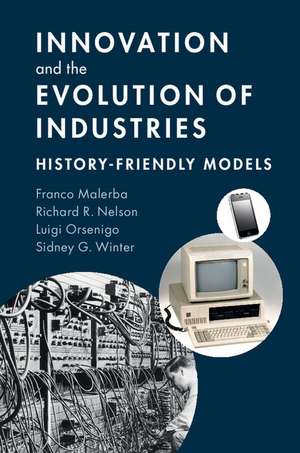Innovation and the Evolution of Industries: History-Friendly Models
Autor Franco Malerba, Richard R. Nelson, Luigi Orsenigo, Sidney G. Winteren Limba Engleză Paperback – 10 aug 2016
Preț: 207.40 lei
Preț vechi: 230.57 lei
-10% Nou
Puncte Express: 311
Preț estimativ în valută:
39.70€ • 43.14$ • 33.37£
39.70€ • 43.14$ • 33.37£
Carte indisponibilă temporar
Doresc să fiu notificat când acest titlu va fi disponibil:
Se trimite...
Preluare comenzi: 021 569.72.76
Specificații
ISBN-13: 9781107641006
ISBN-10: 1107641004
Pagini: 292
Ilustrații: 41 b/w illus. 4 tables
Dimensiuni: 152 x 228 x 16 mm
Greutate: 0.43 kg
Editura: Cambridge University Press
Colecția Cambridge University Press
Locul publicării:New York, United States
ISBN-10: 1107641004
Pagini: 292
Ilustrații: 41 b/w illus. 4 tables
Dimensiuni: 152 x 228 x 16 mm
Greutate: 0.43 kg
Editura: Cambridge University Press
Colecția Cambridge University Press
Locul publicării:New York, United States
Cuprins
1. Innovation and industrial evolution; 2. History-friendly models: methods and fundamentals; 3. The US computer industry and the dynamics of concentration; 4. Vertical integration and dis-integration in the computer industry; 5. The pharmaceutical industry and the role of demand; 6. Reprise and conclusions.
Recenzii
'This book offers welcome advancements to the understanding of industrial dynamics as innovation-driven evolutionary processes. Over the last forty years or so, major progress has been made both in the identification of relatively general 'stylized facts' of industrial evolution and in their account by means of evolutionary models. Much less has been done toward bringing formal theories to the specificities of particular industry histories. This is what this work does, using phenomenologically very detailed models as a sort of coherent thought experiment on the causal mechanisms, yielding the specific features of the histories of the computer, semiconductors and pharmaceutical industries. To be read by history-inclined scholars generally skeptical about any formalization. And to be read by modelers often weary of qualitative histories.' Giovanni Dosi, Scuola Superiore Sant'Anna, Pisa
'Four of the world's leading evolutionary economists have combined to build this new and exciting bridge between economic theory and history. Every scholar who is interested in innovation, research and development, competition, and industrial organization will want to cross this bridge. Many will find here important challenges for their future work in economic and business history as well as economics.' Louis Galambos, Johns Hopkins University
'The co-authors of this volume are pioneers in the development of 'history-friendly models' of the evolution of knowledge-intensive industries. This book extends and elaborates that work, enriching our understanding of the development of the computer, semiconductor, and pharmaceuticals industries. The volume is a major contribution to economics, strategy, and policy.' David C. Mowery, William A. and Betty H. Hasler Professor of New Enterprise, Emeritus, University of California, Berkeley
'Four of the world's leading evolutionary economists have combined to build this new and exciting bridge between economic theory and history. Every scholar who is interested in innovation, research and development, competition, and industrial organization will want to cross this bridge. Many will find here important challenges for their future work in economic and business history as well as economics.' Louis Galambos, Johns Hopkins University
'The co-authors of this volume are pioneers in the development of 'history-friendly models' of the evolution of knowledge-intensive industries. This book extends and elaborates that work, enriching our understanding of the development of the computer, semiconductor, and pharmaceuticals industries. The volume is a major contribution to economics, strategy, and policy.' David C. Mowery, William A. and Betty H. Hasler Professor of New Enterprise, Emeritus, University of California, Berkeley
Notă biografică
Descriere
A new approach to the analysis of technological process, emphasising the tailoring of formal modelling to historical context.
